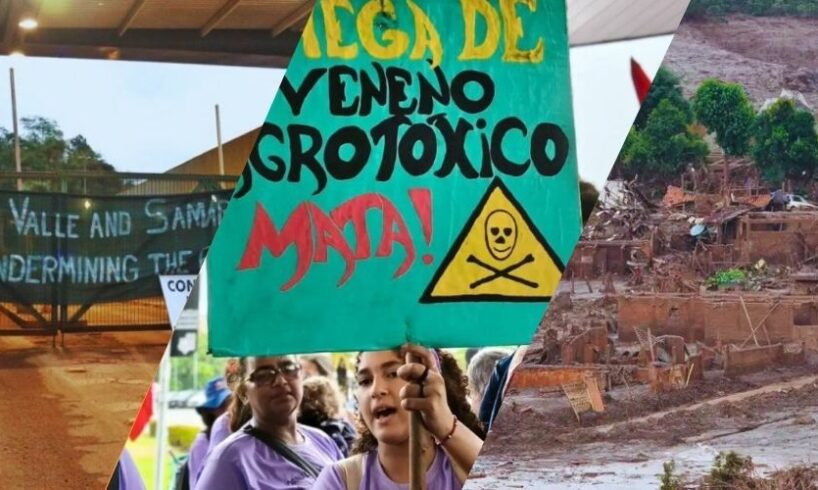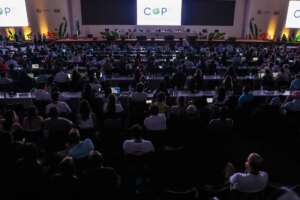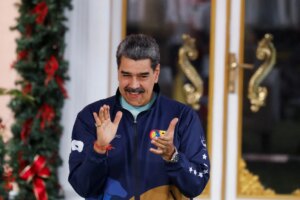
In September, the MST emphasized the urgent need for a “Popular Agrarian Reform to Protect Nature,” calling out agribusiness for its environmental and social harms in Brazil.
They highlight five major cases.
Braskem Case in Alagoas
The global petrochemical company Braskem and its employees in Maceió, Alagoas, were investigated by the Federal Police, resulting in the indictment of 20 individuals for social and environmental crimes related to the exploitation of rock salt in the state.
The company’s misconduct also prompted the creation of a Parliamentary Commission of Inquiry (CPI) in the National Congress, which investigated Braskem’s operations in Maceió and concluded that the mining company committed six crimes. These ranged from omission—failing to take necessary preventive measures—to pollution and the extraction of raw materials in violation of legal obligations, including mining more rock salt than safety regulations allowed.
The CPI recommended the indictment of Braskem and 11 individuals linked to the company and its service providers.
In 2018, residents of Maceió began experiencing the first visible impacts of these crimes, including cracks and craters in the ground, and earthquakes that destroyed homes and forced the evacuation of several neighborhoods. However, the disaster was predictable, as mining had been ongoing since the 1970s, when Braskem began exploiting minerals in Maceió. Improper mining practices led to ground instability, damaging hundreds of houses with cracked walls and sinking foundations.
More than 60,000 families were relocated, and over forty public and private schools were closed. Several companies went out of business, leaving workers unemployed. The environmental disaster affected five neighborhoods near the Mundau Lagoon, covering 20% of the territory of Alagoas’ capital.
This case is considered the largest environmental crime in an urban area worldwide and highlights the challenges throughout the energy transition chain—from component manufacturing to labor—where such practices can harm both the environment and surrounding communities.
Margarida da Silva, from the national coordination of the MST and a settler in Italaia (AL), denounces this as the largest environmental crime on urban soil globally. She explains that, in addition to soil subsidence destroying neighborhoods, the Mundau Lagoon was contaminated by the collapse of Braskem’s 18th mine, impacting shellfish gatherers and local fisherfolk.
“We denounce predatory capital and agribusiness, which appropriates nature’s resources and displaces communities. Braskem in Maceió is a clear example: environmental crimes caused social, environmental, and economic damage. One of Braskem’s mines collapsed into the Mundau Lagoon, affecting all marine life and directly impacting the livelihoods of shellfish gatherers and fishermen. We call on the people of Alagoas and Brazil to hold those responsible accountable and to reject the normalization of agribusiness destroying the environment. Popular Agrarian Reform must play a central role in defending the environment, combating hunger, and addressing social and economic inequalities in our country.”
Massive Use of Pesticides by Agribusiness in Mato Grosso
In Mato Grosso, agribusinesses that market themselves as “pop and tech” in mainstream media and social networks have become major drivers of environmental destruction.
Three Brazilian biomes—the Cerrado, Pantanal, and Amazon—suffer from the impacts of large-scale monoculture production, including soy, corn, and cotton, alongside the expansion of mining and large hydroelectric projects.
“This ore-hydro-agribusiness seeks to exploit nature, privatize communal resources, and generate profit for companies at the expense of our territories. Communities face constant pressure from this system. Aerial spraying of pesticides has devastated settlements, contaminating agroecological crops and acting almost like a chemical weapon, frightening families, and sometimes forcing them to abandon their land. Staying in settlements has become a major challenge,” denounces MST leader Valdeir Souza.
Cities and entire regions also suffer from agribusiness real estate speculation and agrochemical impacts. In northern Mato Grosso, a key agribusiness hub, human health has worsened dramatically, with high rates of cancer, childhood anomalies, and other health problems—correlating with intensive monoculture and pesticide use.
“Given this, it is essential to demonstrate that an alternative production model exists—one that produces healthy food fairly, respects nature, and comes from peasant families practicing agroecology. Popular Agrarian Reform is fundamental to democratizing land, confronting agribusiness, producing healthy food, and protecting the environment,” concludes Valdeir.
Samarco Case in Mariana, Minas Gerais
On November 5, 2015, the Fundão dam in Mariana, Minas Gerais, owned by Samarco (a joint venture of Vale and BHP Billiton), collapsed, releasing 43.8 million cubic meters of mining tailings into the Doce River basin.
Nineteen people died, hundreds of families were displaced, and entire communities in Minas Gerais and Espírito Santo were destroyed. The mud traveled 663 kilometers, reaching the Atlantic Ocean, cutting off drinking water for 1.2 million people, and devastating the Doce River basin across dozens of municipalities.
Edilene dos Santos Costa, an MST resident of Vale do Rio Doce, explains that the impacts of the Samarco disaster continue to affect settlements, preventing families from farming.
“Nineteen settlement areas were affected, five directly. Families are still unable to cultivate crops due to contaminated soil. Every rain carries more tailings down the Doce River, further polluting the land. The company remains unpunished despite the tragedy. For us, true reparations mean implementing Popular Agrarian Reform in the Rio Doce valley and across the country to create a production model that preserves life and nature.”
According to investigations by the Federal Police and the Federal Public Ministry, 21 people connected to Samarco and its shareholders, Vale and BHP Billiton, were charged with qualified homicide and environmental crimes. Yet, in Brazil, these crimes remain unpunished.
“No one was arrested or held criminally accountable for the deaths and the damage caused,” notes Thiago Alves of the Movement of People Affected by Dams (MAB).
Advancement of Energy Capital in Paraíba
During the National Day of Struggles of Landless Women in March, peasants in Paraíba denounced the expansion of the energy sector and agribusiness over MST camps and settlements. During a protest at the solar energy company Atiaia, they highlighted unfair land leasing, barriers to producing healthy food, environmental destruction, and threats to peasant livelihoods caused by solar and wind energy projects.
In São Paulo, the Landless Movement reports that foreign renewable energy companies are invading Agrarian Reform territories, supported by public funds, displacing peasant families.
“In Paraíba, large solar and wind plants are displacing our communities, especially three foreign companies receiving public funding via BNDES and Sudene: EDP Energia (Portuguese, Serra da Borborema Wind Complex), Non Energia (Spanish, Paraibano Hinterland Wind and Solar Complex), and CTG Brasil (Chinese, West Seridó Wind and Solar Complex). These companies profit by taking over Brazilian territory and expelling peasant families,” denounces Paulo Romario, MST national coordinator in Paraíba.
Paulo emphasizes that MST is not against renewable energy but opposes a model that expropriates territories, displaces communities, and receives public subsidies to benefit large companies.
“Peasant territories should produce food for the Brazilian people. Climate action must involve the people in struggle, changing the production model, overcoming capitalism, and building a society based on sustainable relations with nature. Energy transition must be decentralized, cooperative, and environmentally just.”
The MST argues that Agrarian Reform, alongside demarcation of indigenous and quilombola lands, should be central to a popular national project that preserves nature, produces healthy food, and protects common goods.
Matopiba Project in Maranhão
Matopiba, established in 2015, covers 73 million hectares across Maranhão, Tocantins, Piauí, and Bahia, comprising 31 microregions and 337 municipalities.
It was created to expand agribusiness commodity production for export. This expansion has driven significant deforestation, threatened traditional communities and Agrarian Reform settlements, reconcentrated land, and increased real estate speculation and financialization of agriculture.
Irismar Oliveira, an MST settler in Cristina Alves, Maranhão, reports that in the Vale do Itapecuru region, traditional communities face ongoing struggles against agribusiness expansion.
“Large companies have targeted the region, including areas previously belonging to João Santos. We face the full impact of land seizures, pesticide intensity, and destruction of lives, biodiversity, and rivers.”
Matopiba is one of the fastest-growing agribusiness regions in planted area, according to the Ministry of Agriculture (MAPA).
However, this growth comes at the cost of native vegetation and environmental destruction. In 2024, 82% of Cerrado deforestation occurred in Matopiba, according to the Cerrado Deforestation Alert System (SAD Cerrado).
Facing these threats, MST families are engaged in permanent mobilization.
“We resist in our territories, striving to build new life projects that care for nature and biodiversity. We will withstand the onslaughts of big capital,” Irismar says.
To read the full article, visit the MST website.





